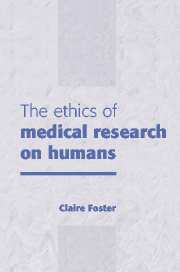Book contents
- Frontmatter
- Contents
- Foreword by Professor Sir David Weatherall
- Acknowledgements
- 1 An introduction to the ethical issues
- 2 Goal-based morality: scientific rigour in research
- 3 Duty-based morality: acting in the research subjects' best interests
- 4 Right-based morality: respecting the autonomy of research participants
- 5 From principles to practice
- 6 Case studies of goal-based issues
- 7 Case studies of duty-based issues
- 8 Case studies of right-based issues
- 9 A framework for ethical review: researchers, research ethics committees, and moral responsibility
- References
- Index
1 - An introduction to the ethical issues
Published online by Cambridge University Press: 15 August 2009
- Frontmatter
- Contents
- Foreword by Professor Sir David Weatherall
- Acknowledgements
- 1 An introduction to the ethical issues
- 2 Goal-based morality: scientific rigour in research
- 3 Duty-based morality: acting in the research subjects' best interests
- 4 Right-based morality: respecting the autonomy of research participants
- 5 From principles to practice
- 6 Case studies of goal-based issues
- 7 Case studies of duty-based issues
- 8 Case studies of right-based issues
- 9 A framework for ethical review: researchers, research ethics committees, and moral responsibility
- References
- Index
Summary
Introduction
It must be the dream of any ill person to be cured effectively and immediately, with no side effects. Every doctor's dream must be to provide such a precise service. It might happen sometimes, but the reality is rarely so satisfactory. Even when ‘miracle cures’ like penicillin are discovered, the appearance of absolute cure with no side effects turns out to be different from the actual experience, sometimes long after the medicine has been discovered. However, it is just as well that throughout the history of medicine, some doctors have never accepted the idea that complete cures are a delusion and stopped looking for them. For if research is not undertaken, medicine would not progress in the remarkable ways that it has. There may not be many complete cures, but there are treatments for numerous conditions that previously would have killed or disabled for life. It has also been established that some treatments are useless or even harmful. The ultimate goal of medical research must be to find complete cures; the more prosaic actual achievements do, nevertheless, help a great deal.
To improve medical care as much as we can, if not to perfect it, means that we have to accept the need for research. Some argue that the real art of medical care is to prevent people falling ill in the first place. Prevention is better than cure, particularly if it does not involve taking drugs. Even to establish what constitutes healthy living requires research, however.
- Type
- Chapter
- Information
- The Ethics of Medical Research on Humans , pp. 1 - 12Publisher: Cambridge University PressPrint publication year: 2001



